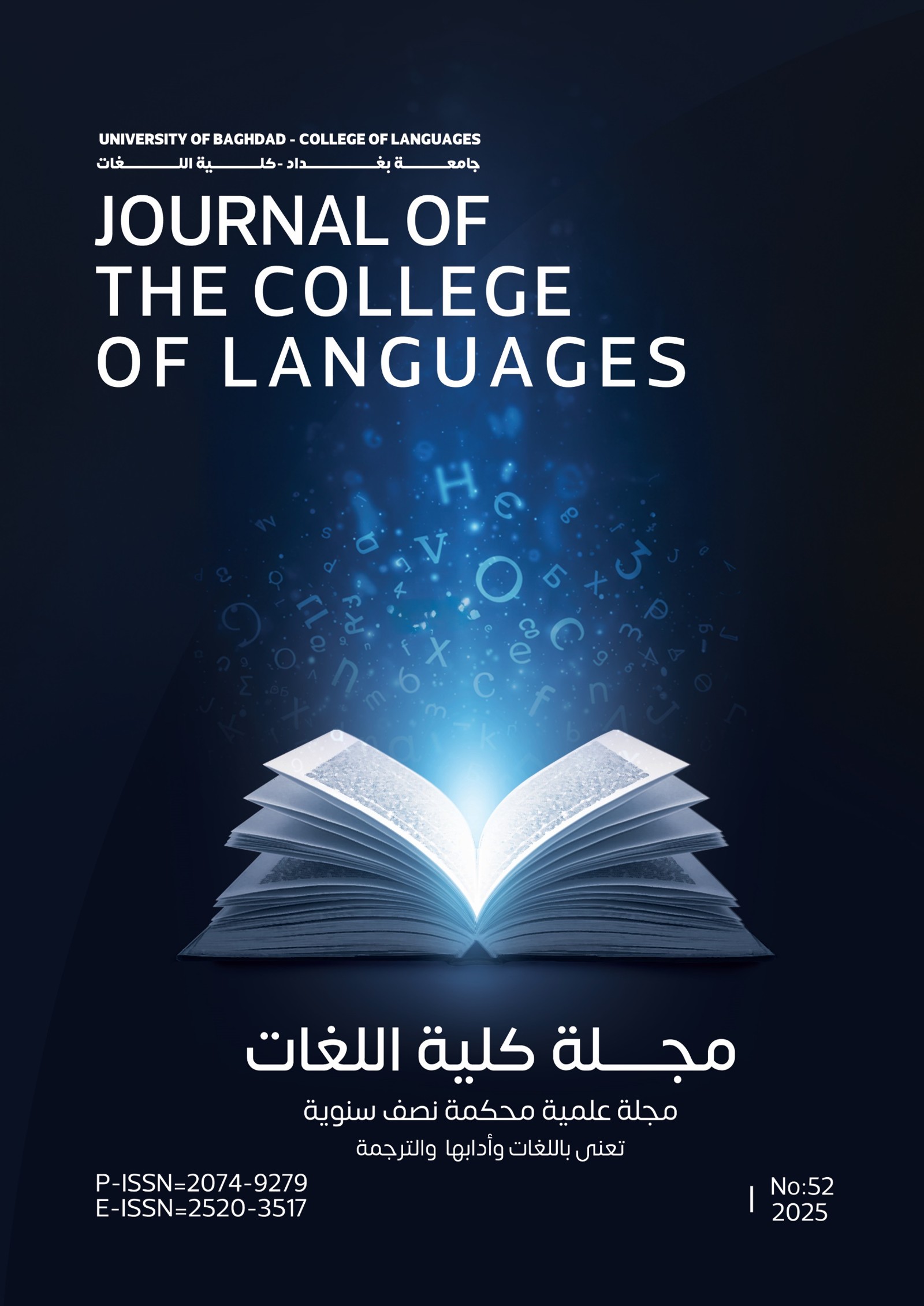Qualitative evaluation of destinations in the Arabic translation of Naguib Mahfouz's short stories based on Jean – Rene Ladmiral theory
ارزیابی کیّفی مقصدگرایی در ترجمه ى داستانهای کوتاه نجیب محفوظ به زبان فارسى بر اساس نظریه ژان رنه لادمیرال
DOI:
https://doi.org/10.36586/jcl.2.2024.0.50.0191Keywords:
translation evaluation, Arabic short story, destinations of translation, Naguib Mahfouz, Jean- Rene Ladmiral, ارزیابی ترجمه، داستان کوتاه عربی، مقصدگرایی ترجمه، نجیب محفوظ، ژان رنه لادمیرالAbstract
Evaluating translations and expressing their strengths and weaknesses can be a way forward for translators in this field and make the knowledge of translation more vibrant and dynamic. Since the purpose of translation is to better understand the text in the target language, the current research has analyzed the destinations of the translation of some of Naguib Mahfouz's short stories with the analytical-descriptive method and relying on the theoretical framework of Jean- Rene Ladmiral in order to determine its compatibility with the components This theory is valid. After examining and comparing the original text and the Persian translation, it was found that in the translation of these stories, the components of Admiral's theory such as displacement, legibility and heterogeneity have the highest frequency. Also, the translator has used the components of increase, disambiguation and deletion, which has tried to bring the original text closer to the destination and has provided a destination-oriented translation. Also, the components of minimal interpretation and the essence of translation were seen less in the translation. In some cases, he has turned to free translation of meanings and words, which has led to a translation far from difficulty and ambiguity in understanding the author's meaning.
چکیده
ارزیابی ترجمهها و بیان نقاط قوت و ضعف آنها میتواند برای مترجمان در این عرصه راهگشا بوده و دانش ترجمه را بالندهتر و پویاتر نماید. از آنجایی که هدف از ترجمه فهم بهتر متن در زبان مقصد است، پژوهش حاضر با روش تحلیلی- توصیفی و با تکیه بر چارچوب نظری لادمیرال، مقصدگرایی ترجمه برخی از داستانهای کوتاه نجیب محفوظ را که توسط محمد رضا مرعشی پور به فارسی ترجمه شده است، مورد واکاوی قرار داده است تا میزان تطابق آن را با مؤلفههای این نظریه بسنجد. پس از بررسی و تطابق متن اصلی و ترجمه فارسی، مشخص گردید که در ترجمه این داستانها، مؤلفههای نظریه لادمیرال نظیر جابهجایی، خوانایی و ناهمگونسازی بیشترین بسامد را دارا میباشند. همچنین مترجم از مؤلفههای افزایش، رفع ابهام و حذف نیز بهره گرفته که سعی بر نزدیک کردن متن اصلی به مقصد بوده و ترجمه مقصدمحوری ارائه داده است. همچنین مؤلفههای تفسیر حداقلی و چیستی ترجمانی کمتر در ترجمه دیده شد. وی در مواردی هم به ترجمه آزاد مدلولها و واژگان روی آورده که این امر منجر به ترجمهای دور از تکلف و ابهام در درک منظور نویسنده شده است.
References
Al-Attabi, Raheem Mezher, Comparative study of central characters in the novel "Al-Shahaz" and Hamoun's movie, College of Languages Magazine, Issue No. 46/2022
Babazadeh Aghdam, A. & others (2021); "Criticism of Mohammad Dashti's translation of Nahj al-Balagha's wisdom based on Admiral's model", Quran and Hadith translation studies; Volume 8, Number 15, pp. 63-95. (In Persian)
Baker, M. & Gabriela, S., (2017); Encyclopedia of translation studies, Translated by: Hamid Kashanian, Tehran, new publication. (In Persian)
Baker, M. (2014); In other words, translated by: Ali Bahrami, Tehran, Rahnama publishing house. (In Persian)
Haqqani, N. (2007); Comments and theories of translation, Tehran, Amir kabir Publications. (In Persian)
Delshad, Sh. & Masbouq, S. M., (2016); "A comparative study of the process of elimination or entropy in Persian translations of One Thousand and One Nights", Journal of Language and Translation Studies, Volume 49, Number 1, pp. 57-82. (In Persian)
Delshad, Sh. & Masbouq, S. M. & Abdi, S. (2016); "A review of Abdul Latif Tsuji's translation of the basic story of One Thousand and One Nights based on the example of Jean-René Ladmiral", Translation Researches in Arabic Language and Literature, Volume 6, Number 15, pp. 41-61. (In Persian)
Salimi, Z. & Nazari, A. (2023); "Analysis and criticism of Dashti's translation of Nahj al-Balagheh based on Admiral's point of view", Alavi Research Journal, Volume 13, Number 25, pp. 169-196. (In Persian)
Faizi, Parisa , The practical application of Jean-René Ladmiral's model in translation from Arabic to Persian, Journal of the College of Languages, Issue 49 / 2024
Sayadani, A. & Asgharpour, S. (2017); "Evaluation of the translation process of Nahj al-Balaghah words based on Admiral's theory", Qur'an Translation Studies, Volume 4, Number 8, pp. 133-159. (In Persian)
Gentzler, Edwin (2014); Theories of translation in the present era, translated by: Ali Solhjo, second edition, Tehran, Hermes Publishing. (In Persian)
Gilani, E. & Ahmadian, H. & Nouri, M. (2017); "Ten short stories of Najib Mahfouz centered on women from the perspective of Vladimir Propp's structuralism", 6th National Conference of Literary Criticism and Theory, Gonbad kavous, University of Mashhad. (In Persian)
Ladmiral, J. R., (2021); Propositions about translation, translated by: Fatemeh Mirza Ebrahim Tehrani, Tehran, Logos Publishing. (In Persian)
Mohseni, S. (2009); Translation of the introduction and the fourth chapter of the book Translating Case Studies for the translation of the work: Jean-René Ladmiral, Master's thesis, Shahid Beheshti University. (In Persian)
Mahfouz, N., (2021); Khakaster, collection of short stories, translated by: Mohammad Reza Marashipour, Tehran, Nilofar. (In Persian)
Mahfouz, N (2006); Al Ammal Al-Kamala, volume 5, Egypt, Dar al-Shoroq. (In Arabic)
Mehdipour, F. (2011) "Jean René Admiral; Cases to face the problems of translation", Book Month of Literature, Volume 165, Number 51, pp. 48-52. (In Persian)
Nasiri, R. & Mustafavi, Mohammad J. (2016) "Magic realism in some short stories of Najib Mahfouz", Lesan Mobin, No. 26, pp. 171-147. (In Persian)
Niazi, Sh. & Ghasemi Assal, Z. (2019); Models of translation evaluation, second edition, Tehran, Tehran University Press. (In Persian)
Downloads
Published
Issue
Section
License
Copyright (c) 2024 Journal of the College of Languages (JCL)

This work is licensed under a Creative Commons Attribution 4.0 International License.








